GCSE Results 2024
Key headlines:
- Continued success for female students as they outperform male students in most Core-STEM subjects, achieving more top grades again in 2024.
- We see a slight dip in grades across Core-STEM subjects but they remain stable overall.
- More positively there’s increased female participation across optional subjects – Computing, Statistics and Design and Technology.
- Statistics is the largest growing GCSE subject with a 19.9% increase.
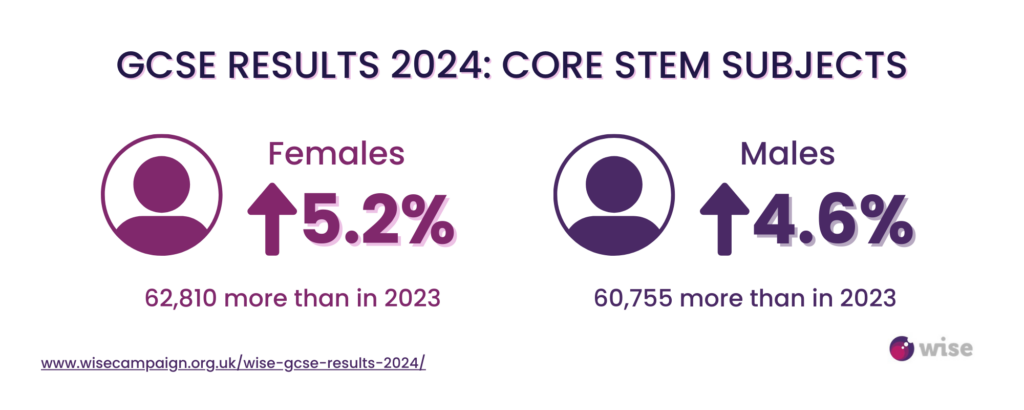
Overview of Core-STEM GCSEs
Female participation is up across Core-STEM subjects with a 5.2% increase, this edges participation closer to achieving gender parity with females making up 47.8% of the overall cohort. Much like last week’s A-Level results, the increased participation of male students has also increased, having an impact on female participation figures across individual subjects.
Positively, we have seen the largest female participation increases in Statistics, Computing, Additional Mathematics and Construction, highlighting more girls opting to study Core-STEM subjects outside of those already mandated (Mathematics and Sciences).
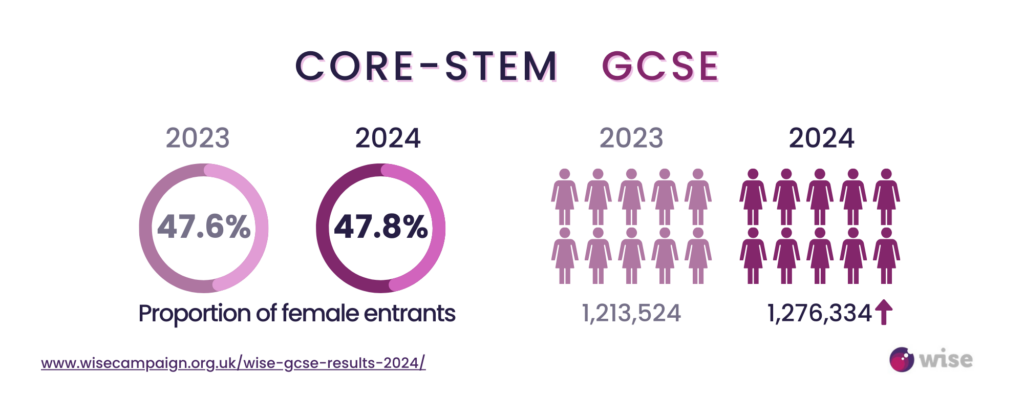
Girls have continue to outperform their male counterparts in achieving top grades (7/A and up) in the majority of Core-STEM subjects. However, in general top grades have seen a decrease in many subjects, as have 4/C grades and above for girls and boys in Core-STEM GCSEs.
Biology GCSE
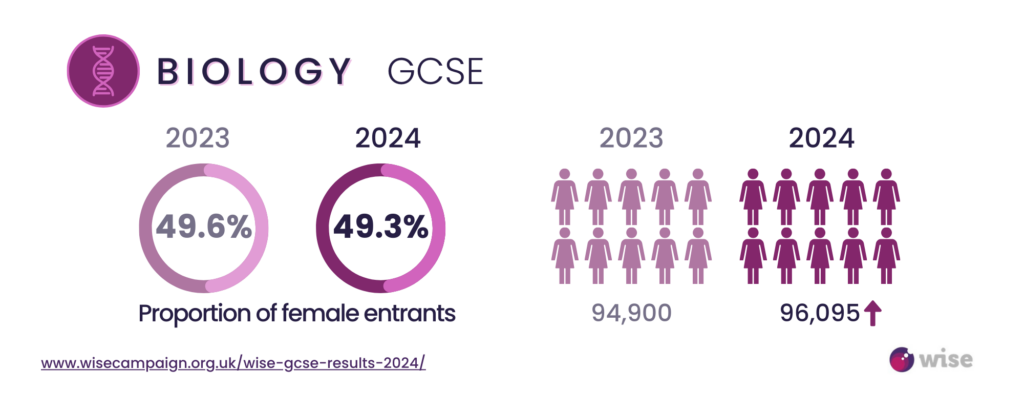
Grades have remained stable for girls in Biology, with them continuing to outperform boys.
9-4 (A*- C) grades have just dropped below 90%, slightly down from last year for girls but shows stability in pass rates, and remains higher than the boys’ results (89%).
Top grades show a bigger difference in results, with 44.6% of girls achieving a 7/A and higher compared to 39.8% of males achieving the same grades.
Chemistry GCSE
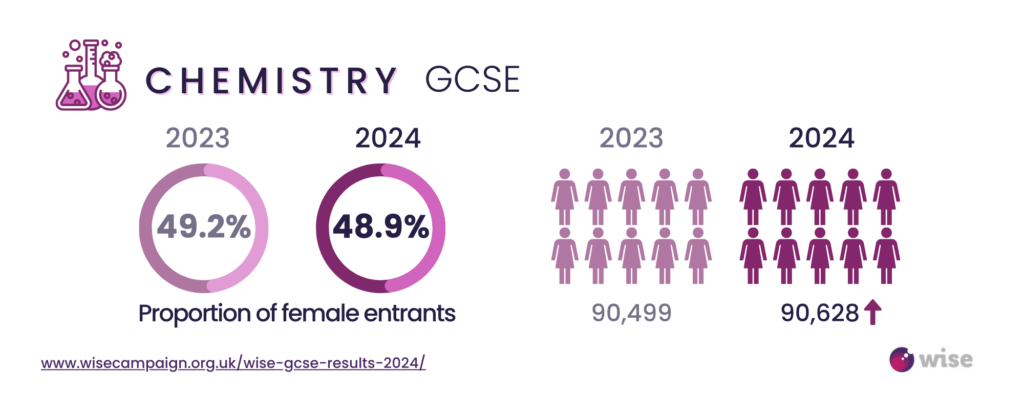
In 2024, Chemistry has become the best science subject area for girls with 90.5% achieving a 4/C and higher, and 45.7% achieving the top grades of 7/A and higher. This is an increase for both from 2023.
Girls continue to outperform boys with the top grades, but 4/C and above were equal this year with boys also achieving 90.5%.
Physics GCSE
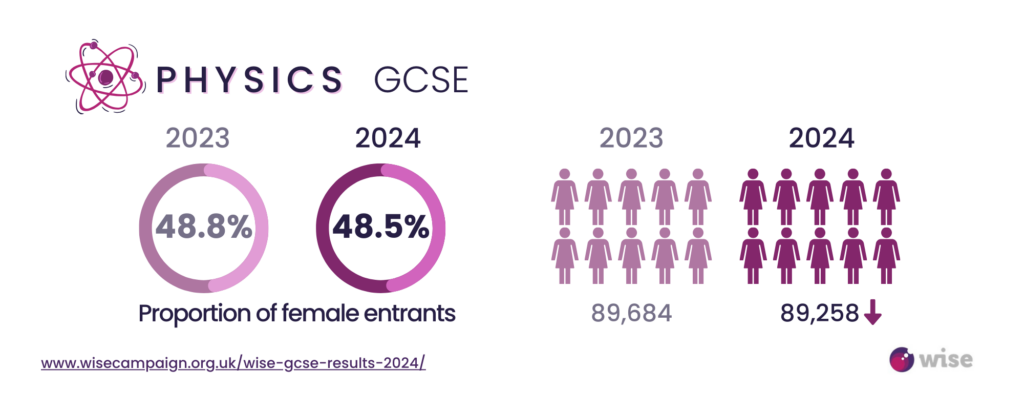
Physics continues to be an area in which boys outperform girls. However, good news as we have seen an increase in the number of girls achieving the top grades (7/A and above), which has risen to 41.3% up from 40.6% in 2023.
Maths GCSE
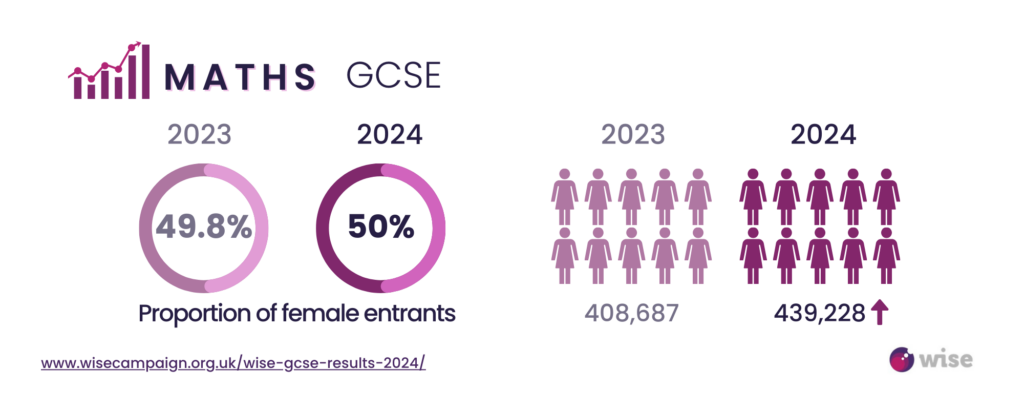
Maths continues to see less top grades being achieved than other Core-STEM subjects, for both girls and boys.
Grades have seen a slight decrease for both too. 15.8% of female entrants achieved a 7/A and above (down from 16.6% in 2023) compared to 18% of male entrants (also down from 18.4% in 2023). Girls achieving 4/C and above dropped from 60.4% to 58.9% in 2024, similarly for boys they saw a decrease from 61.9% to 60.2%.
Computing GCSE
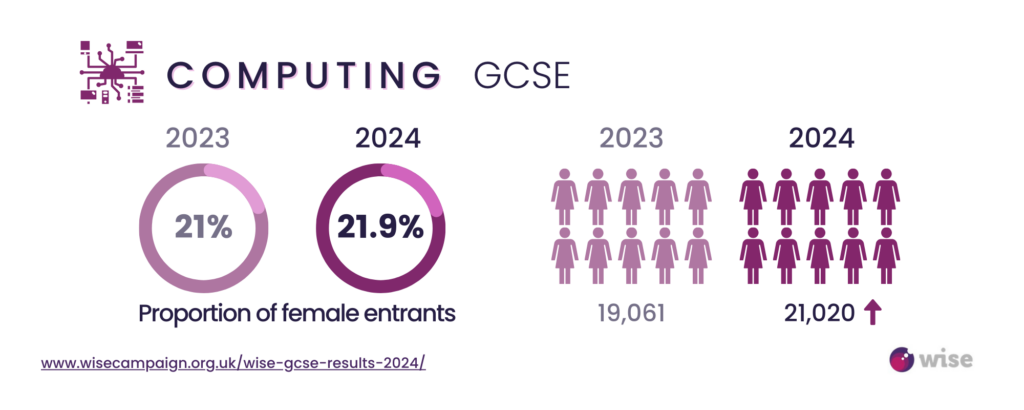
It’s positive to see Computing GCSE female entrants rose again this year with a 10.3% increase.
Despite the lower numbers of girls taking Computing at GCSE, girls still significantly outperform boys for academic attainment. Of the female students that took the Computing GCSE, 35% received 7/A and above, compared to only 26.4% of male students. 75.5% of female entrants received 9-4/A*-C, outperforming male students who received 66.3% respectively.
Engineering GCSE
Although we’re still seeing far fewer girls choosing Engineering as one of their GCSEs, it’s another area where they significantly outperform their male counterparts.
In Engineering, 73.3% of female entrants were awarded 4/C and above grades, compared to 51.7% of male students.
32% of girls achieved top grades (7/A and above) in Engineering, whereas only 11.8% of boys did.
The gender gap is still far too large with females only making up 16.3% of the cohort, compared to 17.3% in 2023.
Design and Technology GCSE
Design and Technology has seen an increase in female participation with 31.2% of entrants now being female, a welcomed increase after 2023 saw a 10.2% decrease.
Girls continue to perform well with 32.3% achieving top grades (7/A and above) compared to 17.7% of boys, and 77.1% of girls achieving 9-4 (A*-C) compared to 61.2% of boys.
Science Double Award GCSE
Science Double Award remains an equal split in gender, with 49.8% of the cohort being female. Grades are also stable with 10% of girls achieving the top grades (7/A and above) and 58.6% getting a 4/C or higher.
Other Sciences GCSE
For Other Sciences, the gap widens in top grades with 30.9% of female entrants were awarded 7/A and above, compared to 40.7% of male entrants.
Statistics GCSE
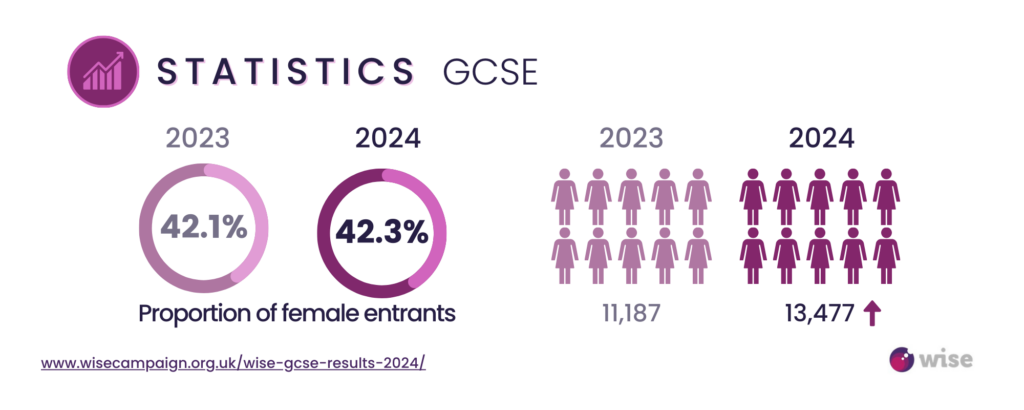
Good news for Statistics, as it sees the largest increased participation outside of the top 10 subjects, with a 19.9% increase in 2024. 20.5% more girls took Statistics in 2024, with the overall female participation now sitting at 42.3%.
It’s great to see participation up, but this is one of the few areas where girls continue to fall behind their male counterparts in terms of grades. 18.1% of girls achieved the top grades (7/A and above) compared to 21.3% of boys.
Construction GCSE
Construction had a 49.2% increase in the number of girls who completed the GCSE in 2024. This equated to a 3% increase in overall participation, with girls now making up 12.6% of the cohort.
Grades remained high with 84.3% of girls achieving a 4/C or higher, compared to 75.1% of boys.
Mathematics (Additional) GCSE
Mathematics (Additional) remains the highest in grades with 95.7% of female entrants receiving a 9-4/A*-C, with 61.9% achieving the top grades (7/A and above).
Female entrants were up by 16% seeing the gender gap close as nearly 48% of entrants were girls in 2024 (up from 45.8%).
WISE Managing Director, Dr Laura Norton commented on the fantastic results received by GCSE students but noted that “As always, days like this highlight the work we still have to do in closing the gender gap within STEM. It is essential girls see a place for themselves and continue to pursue their passion and utilise their talent in STEM subjects. We need to close the gender gap to diversify the talent by encouraging girls to pursue STEM subjects beyond GCSE and embark on careers within our sector.”
Read the full news story here.
Get in Touch with WISE
WISE exists to deliver women-centred equity, diversity and inclusion to the STEM sectors, with many leading UK organisations improving their gender balance through membership.
To speak to someone about membership, email info@wisecampaign.org.uk or visit the membership page for more details.
